North Carolina War Between the States Sesquicentennial
Christmas in North Carolina and the South
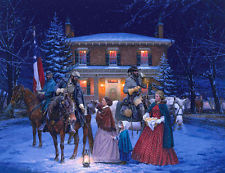
Christmas in North Carolina in antebellum times was more a religious and family tradition
and celebrated without official ceremony. Except for doubling the watch, the town commissions
ordinarily made no occasion of the day and left it to quiet church services, visiting parties,
and pleasant family reunions.
It followed the Thanksgiving observance which was first set aside on the third Thursday in
November by President James Madison in 1812, for fasting and thanksgiving on the conduct
of the war against the British. The governor accordingly issued a proclamation inviting
citizens to meet in prayer and fasting in their respective communities.
In 1848 Governor William A. Graham called for an annual Thanksgiving Day, “a season for kind,
social sentiment – for the forgiveness of injuries – for acts of good neighborhood and especially
for the charitable remembrance of the Poor.” The Legislature, in joint resolution ratified the
Governor’s recommendation on 16 January 1849, and authorized the governor to set apart a
day in every year for public thanksgiving and to give notice of it by proclamation.
“Christmas is coming,” wrote the Wilmington Journal on 23 December 1851, and “. . . were it not for
the little and big niggers begging for quarters, and the “noise and confusion” and the “Kooners,”. . .
and the fire crackers, and all the other unnamed horrors and abominations, we should be much
inclined to rejoice thereat. By the by, egg-nog is a most villainous compound to get sober on.”
Eight years later the Journal wrote regarding Christmas . . . “With a good sense that eschews
Blue-lawism, our town authorities on Christmas generally let the boys have their way so far as
mere noise is concerned, although order in all essential particulars is enforced . . . a good deal
of cheering and shouting, but nothing worse, and as the night wore
on even these ceased, and the town slept.”
Christmas on the plantation was usually a very festive annual affair and slaves took the
occasion as a time for celebration. Guion Johnson’s “Antebellum North Carolina” states that
“It is a mistake to assume that the Southern slave had no money and no means of earning any . . .
and the planter often rewarded his slaves for extra work by giving them small amounts of cash.
Planters found that their slaves worked better and were more contented if they had the
means of obtaining small luxuries for themselves, tobacco, molasses, clothing, furniture
for their cabins. It was customary to give slaves small amounts of money at
Christmas as well as other times of the year.
Slaves were normally given considerable freedom on Saturday afternoons, Sundays, and on
general holidays such as the Fourth of July and Christmas. The old custom of the South of a
lady’s keeping off the streets on Saturday afternoon arose from the presence of
great numbers of slaves in town at that time.
Christmas was the holiday slaves enjoyed most as the plantation hands for several days,
and sometimes from Christmas Day until New Year’s Day. Masters were very generous in
these times in issuing passes for journeys to neighboring plantations to visit relatives or
former masters. The slaves would usually have more money at this time than at any other
during the year as the master seldom failed to distribute financial gifts,
as well as presents on Christmas morning.
One of the diversions of the slaves on Christmas Day was called “John Canoeing” in
Edenton and “John Kunering” in Wilmington. The Negroes arose early Christmas morning,
singing their John Canoe songs and shouting “Chris’mas gif” at their masters’ doors.
With liquor on their breaths and money in their pockets, the spent the day in lone long jubilee.
(see more on this custom at: http://www.cfhi.net/JohnKuneringatChristmas.php
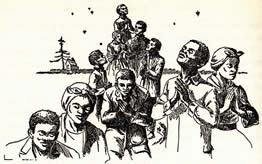
Before 1830 it was common for masters to educate their slaves, and especially those who
displayed intelligence and an ability to learn and excel. Most all masters would educate their
slaves in Christianity and encourage Christian habits in their moral and ethical lives.
This was despite the laws after the 1831 Nat Turner massacre in Virginia, in which nearly
70 women, children and old men were hacked to death by Turner and his gang. Turner
had become a black preacher and claimed to have heard voices directing him to his
murderous rampage, hence the barring of slave education after 1831.
The following provide insights to better understand the experience of North Carolinians
and Southerners in general before and during the war. It goes without saying that the war years,
especially after 1863, were times of sacrifice, scarcity and privations.
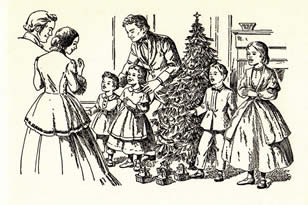
The Plantation Christmas
“No sooner was the harvest over, than preparations for Christmas began. Whole calves were
barbequed, pigs roasted, while wild game and venison were hunted. For days ahead there
was much cooking of plum pudding, fruit cakes, Sally White cakes, pies and all sorts of
good things, (they make your mouth water to think of them). The big Yule log was brought
in from the swamp the day before Christmas, where it had been soaking for weeks, the alert
darkies knowing that as long as it burned in the “great house” they would stop working.
The mansion was elaborately dressed with evergreens, while branches of dried cedar dried hydrangea
blooms were powdered with flour, making feathery white blossoms, as if in summer time. The holly
tree was ornamented with long strings of popped corn, strung by the white and colored children.
Early Christmas morning the “Great House” was awakened by the singing of the darkies and
voices calling out – “Ch’mas gif’, master, “Ch’mas gif”, mistress.” On the great tree were gifts for
everyone on the plantation. In the low country of the South the Negroes dressed themselves
as clowns, grotesque costumes (being known as “John Kunners”) and marched around ringing
bells, as the danced, singing – “Ch’mas comes but once a year, hurrah Johnnie Kunner –
give poor [Negro] one more cent, hurrah John Kunner.” With the passing of their hats,
pennies were dropped by the “white folks.”
Words fail to express the Christmas dinner of the old plantation. In front of “Marster” was a
roast pig (red apple in his mouth) or the largest gobbler. Innumerable were the desserts or sweet –
syllabub, custard, trifle, wine jelly, cocoanut and lemon puddings, mince pies, every kind of cake,
and Snow Balls especially for the children.
With the dinner, wines were served, made from the plantation scuppernong, James or Catawba grapes,
or from the luscious blackberry. In the quarters was served a wonderful repast to the entire colored
population, and their gayeties were shown in dancing the “double shuffle,” the “break down,” the
“chicken in the bread tray,” and the “pigeon wing,” followed by the “cake walk.” Up in the Mansion
the family and guests probably engaged in the Virginia Reel or other forms of dancing.
Until New Years’ Day, the festivities would continue, a party at every plantation within riding distance,
each house overflowing with merriment. A plantation Christmas would not be complete without a
fox hunt, for “to ride with the hounds” was one of the accomplishments necessary to the planter
and his sons. Space forbids further description of the happiness of life on an antebellum plantation
in the South, but many of our Southern writers have given indelible pictures of the bond between
master and slave, which was unique, will go down as an example of understanding affection.
Without trying to condone the rare case of unkindness from planters toward their slaves,
on the whole they were well treated and the hearts of the two races
were closely knit in the old plantation system.
There was a personal interest in the heart of the planter and his family for these dusky folks
who belonged to them. And they had a pride in their slaves that was reciprocated by them,
who felt that their “White Folks” were better than any others. In writing of the race problem
(after the Sixties) Henry W. Grady of Georgia said: “As I recall my old plantation home,
the spirit of my old Black Mammy from her home above the skies, looks down to bless
me, and through the tumult of the night the sweet music of her crooning, as she held me
in her arms and lead me smiling to sleep.”
One writer says: “The old plantation life is gone, but in that era of the Old South were
found the very finest and highest types of loyalty and of patriotism that America will ever know.”
(Plantation Life in the Old South (excerpt), Lucy London Anderson, The Southern Magazine, May 1934, page 10)
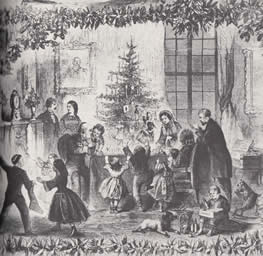
Christmas Cheer on the Plantation:
“The great fete of the people was Christmas. [All] times and seasons paled and dimmed
before the festive joys of Christmas. It had been handed down for generations . . . it had
come over with their forefathers. It had a peculiar significance. It was a title. Religion had
given it its benediction. It was the time to “Shout the glad tidings.” It was The Holidays.
There were other holidays for the slaves, both of the school-room and the plantation, such as Easter
and Whit-Monday; but Christmas was distinctively “The Holidays.”
Then the boys came home from college with their friends; the members of the family who moved
away returned; pretty cousins came for the festivities; the neighborhood grew merry; the Negroes
were all to have a holiday, the house-servants taking turn and turn about,
and the plantation made ready for Christmas cheer.
The corn was got in; the hogs were killed; the lard “tried”; sausage-meat made; mince-meat prepared;
the turkeys fattened, with “the big old gobbler” specially devoted to the “Christmas dinner”;
the servants new shoes and winter clothes stored away ready for distribution; and the plantation
began to be ready to prepare for Christmas.
In the first place, there was generally a cold spell which froze up everything and enabled the
ice-houses to be filled. The wagons all were put to hauling wood – hickory; nothing but hickory now;
other wood might do for other times, but at Christmas only hickory was used; and the
wood-pile was heaped high with the logs . . .
In the midst of it came the wagon or ox-cart from “the depot,” with the big white boxes of Christmas
things, the black driver feigning hypocritical indifference as he drove through the choppers to the
storeroom. Then came the rush of all the wood-cutters to help him unload . . . as they pretended
to strain in lifting, of what “master” or “mistis” was going to give them out of those boxes,
uttered just loud enough to reach their master’s or mistress’s ears where they stood looking on,
while the driver took due advantage of his temporary prestige
to give many pompous cautions and directions.
The getting the evergreens and mistletoe was the sign that Christmas had come, was really here.
There were the parlor and hall and dining-room, and, above all, the old church, to be “dressed.”
The last was a neighborhood work; all united in it, and it was one of the events of the year.
Then by “Christmas Eve’s eve” the wood was all cut and stacked high in the wood-house and on
and under the back porticos, so as to be handy, and secure from the snow which was almost
certain to come. The excitement increased; the boxes were unpacked, some of them openly,
to the general delight, others with a mysterious secrecy which stimulated the curiosity to its
highest point and added to the charm of the occasion.
The kitchen filled up with assistants famed for special skill in particular branches of the cook’s art,
who bustled about with glistening faces and shining teeth, proud of their elevation
and eager to add to the general cheer.
It was now Christmas Eve. From time to time the “hired out” servants came home from Richmond
where they had been hired or had hired out themselves, their terms having been common
custom framed, with due regard to their rights to the holiday, to expire in time for them to spend
the Christmas at home. There was much hilarity over their arrival, with their new winter clothes
donned a little ahead of time, they came to pay their “bespecs” to master and mistis.
Later on the children were got to bed, scarce able to keep in their pallets for excitement; the stockings
were all hung up over the big fireplace; and the grown people grew gay in the crowded parlors. Next morning
before light the stir began. White-clad little figures stole about in the gloom, with bulging stockings
clasped to their bosoms, opening doors, shouting “Christmas gift!” into dark rooms at sleeping elders,
and then scurrying away like so many white mice, squeaking with delight, to rake open the
embers and inspect their treasures. At prayers, “Shout the glad tidings”
was sung by fresh young voices with due fervor.
How gay the scene was at breakfast! What pranks had been performed in the name
of Santa Claus! The larger part of the day was spend in going to and coming from the beautifully
dressed church, where the service was read, and the anthems and hymns
were sung by everybody, for everyone was happy.
Dinner was the great event. It was the test of the mistress and the cook, or, rather, the cooks;
for the kitchen now was full of them. The old mahogany table, stretched diagonally across
the dining room, groaned; the big gobbler filled the pace of honor; a great round of beef held the
second place; an old ham, with every other dish that ingenuity, backed by long experience,
could devise, was at the side, and the shining sideboard, gleaming with glass, scarcely held the
dessert. After dinner there were apple-toddy and eggnog, as there had been before.
There were Negro parties, where the ladies and gentlemen went to look on, the suppers having
been superintended by the mistresses, and the tables being decorated by their own white hands.
There was almost sure to be a Negro wedding during the holidays. The ceremony might be
performed in the dining-room or in the hall by the Master, or in a quarter by a colored preacher;
but it was a gay occasion, and the dusky bride’s trousseau had been arranged by her young
mistress, and the family was on hand to get fun out of the entertainment.”
(The Old South, Essays Social and Political, Charles Scribner’s & Sons, 1892, pp. 174-183)
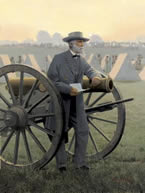
Christmas Letter to One of His Daughters:
Coosawatchie, South Carolina, December 25, 1861
“My Dear Daughter, Having distributed such poor Christmas gifts as I had to those
around me, I have been looking for something for you. Trifles even are hard to get in these
war times, and you must not therefore expect more. I have sent you what I thought
most useful in your separation from me and hope it will be of some service.
Though stigmatized as “vile dross,” it has never been a drug with me. That you may never
want for it, restrict your wants to your necessities. Yet how little it will purchase! But see how
God provides for our pleasure in every way. To compensate for such “trash,” I send you some
sweet violets that I gathered for you this morning while covered with dense white frost,
whose crystals glittered in the bright sun like diamonds, and formed a brooch of great
beauty and sweetness which could not be fabricated by the expenditure of a world of money.
May God guard and preserve you for me, my dear daughter! Among the calamities of war,
the hardest to bear, perhaps, is the separation of families and friends. Yet all must be endured
to accomplish our independence and maintain our self-government. In my absence from you
I have thought of you very often and regretted I could do nothing for your comfort. Your old home,
if not destroyed by our enemies, has been so desecrated that I cannot bear to think of it. I should
have preferred it to have been wiped from the earth, its beautiful hill sunk, and its sacred trees
buried rather than to have been degraded by the presence of those who revel
in the ill they do for their own selfish purposes.
I pray for a better spirit and that the hearts of our enemies may be changed. In your
homeless condition I hope you make yourself contented and useful. Occupy yourself in
aiding those more helpless than yourself. Think always of your father. R.E. Lee.”
(And to One of His Daughters, Civil War Christmas Album, Philip Van Doren, editor, Hawthorne Books, 1961, page 19)
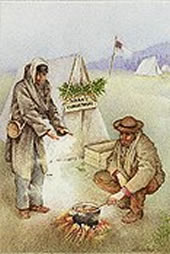
Christmas After Fredericksburg, 1862
“After the battle of Fredericksburg [December 11-15, 1862] the fine weather, clear,
cold and bracing, which we had been having, changed into a real Virginia winter with a good deal
of the Northern thrown in. It snowed, froze, thawed and rained by turns, with here and there
bright days. All military operations were brought to a close, and both armies went into winter
quarters. The latter part of December was fearful; a long rain followed the battle, then a hard,
bitter freeze came. So intense was the cold that the men did nothing but cower over the fire
piled high with wood night and day….the earth was frozen as hard as granite;
the streams were solid: Ice King held all nature in a relentless grasp.
The Christmas of 1862 was cheerless indeed; the weather was frightful, and a heavy
snowstorm covered everything a foot deep. Each soldier attempted to get a dinner in honor
of the day, and those to whom boxes had been sent succeeded to a most respectable
degree, but those unfortunates whose homes were outside the lines had nothing whatever
delectable partaking of the nature of Christmas. Well! It would have puzzled [anyone] to
furnish a holiday dinner out of a pound of fat pork, six crackers, and a quarter of a pound
of dried apples. We all had apple dumplings that day,
which with sorghum molasses were not to be despised.
Some of the men became decidedly hilarious, and then again some did not; not because
they had joined the temperance society nor because they were opposed to the use of intoxicating
liquors, but because not a soul invited them to step up and partake. One mess in the Seventeenth
[Regiment] did not get so much as a smell during the whole of the holidays;
and a dry, dismal old time it proved.
We read in the Richmond papers of the thousands and thousands of boxes that had been
passed en route to the army, sent by the ladies of Richmond and other cities, but few found
their way to us. The greater part of them were for the troops from the far South who were
too distant from their homes to receive anything from their own families. The Virginians were
supposed to have been cared for by their own relatives and friends;
but some of them were not, as we all know.”
(The Christmas After Fredericksburg, Civil War Christmas Album, Philip Van Doren, editor, Hawthorne Books, 1961, page 23)
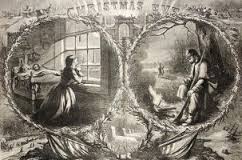
“Now I Just Know This Is Christmas”
"Varina Howell Davis, Mississippi-born wife of the Southern president declared, "That Christmas
season was ushered in under the thickest clouds; every one felt the cataclysm which impended,
but the rosy, expectant faces of our little children were a constant reminder that self-sacrifice
must be the personal offering of each member of the family."
Because of the expense involved in keeping them up, Mr. Davis had recently sold her
carriage and horses. A warm-spirited Confederate bought them back and sent them to her. Now she
planned to dispose of one of her best satin dresses to obtain funds; with Christmas on the way,
the children had high expectations, and she would use all possible makeshifts in an effort to
fulfill them. The Richmond housewives could find no currants, raisins, or other vital ingredients
for old Virginia mincemeat pie. But, Mrs. Davis went on, the young considered at least
one slice their right, "and the price of indigestion...
a debt of honor due from them to the season's exactions."
Despite the war, apple trees still bore fruit; with these as a base, she and the other women
of the city would utilize any other fruit that came to hand. A little cider and some salt were
obtained, as was brandy, though its usual price was a hundred
dollars a bottle in inflated Confederate currency.
As for eggnog, the Negro stable attendant, who brought in "the back log, our
substitute for the Yule log," said he did not know how they would "git along without
no eggnog. Ef it's only a little wineglass." Plans progressed for a quiet home Christmas
when unexpected word arrived: The orphans at the Episcopal home had been promised
a tree and toys, cake and candy, plus a good prize for the best-behaved girl,
and something had to be done about that.
Something was done. With Mrs. Davis's help, a committee of women was set up and the
members repaired to their children's old toy collections to salvage dolls without eyes, monkeys
that had lost their squeak, three-legged and even two-legged horses. They fixed and
painted everything, plumping out rag dolls and putting new faces on them,
adding fresh tails to feathered chickens and parrots.
The Davis's invited a group of young friends on Christmas Eve to help make candle molds
and string popcorn and apples for the tree; Mr. Pizzini, the confectioner, contributed
simple candies. For cornucopias and other ornamentation the Davis's guests used colored
papers, bright pictures from old books, bits of silk out of trunks. All in all, the Christmas Eve
of 1864 was far from unsatisfactory. When the small supply of eggnog went around, the
eldest Davis boy assured his father: "Now I just know this is Christmas."
(The Southern Christmas Book, Harnett T. Kane, David McKay Company, 1958, pp. 208-210)
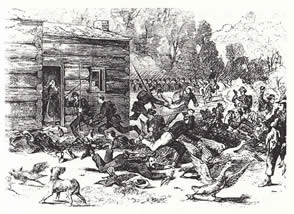
Christmas Vandals in Georgia:
Mrs. Mary S. Mallard in Her Journal [1864, Liberty County, Georgia]
“Monday, December 19th.
Squads of Yankees came all day, so that the servants scarcely had a moment to do anything
for us out of the house. The women, finding it unsafe for them to be out of the house at all, would
run in and conceal themselves in our dwelling. The few remaining chickens and some
sheep were killed. These men were so outrageous at the Negro houses that the Negro men
were obliged to stay at their houses for the protection of their wives; and in some instances,
they rescued them from the hands of these infamous creatures.
Tuesday, December 20th.
A squad of Yankees came soon after breakfast. Hearing there was one yoke of oxen left,
they rode into the pasture and drove them up…needing a chain…they went to the well and
took it from the well bucket. Mother went out and entreated them not to take it from the well,
as it was our means of getting water. They replied: “You have no right to have
even wood or water,” and immediately took it away.
Wednesday, December 21st. 10 A.M. Six of Kilpatrick’s cavalry rode up, one of them mounted
on Mrs. Mallard’s valuable gray named Jim. They looked into the dairy and empty smokehouse,
every lock having been broken and doors wide open day and night. They searched the
servants’ houses; then the thundered at the door of the dwelling. Mother opened it,
when one of them presented a pistol to her breast and demanded why she dared keep
her house closed, and that “he be damned if he would not come into it.”
She replied, “I prefer to keep my house closed because we are a helpless and defenseless
family of women and children.” He replied, “I’ll be damned if I don’t just take what I want.
Some of the men got wine here, and we must have some.” She told them her house had
been four times searched in every part, and everything taken from it. And recognizing
one who had been of the party that had robbed us, she said: “You know my
meal and everything has been taken.”
He said, “We left you a sack of meal and that rice.”
Mother said, “You left us some rice; but out of twelve bushels of meal you poured out
a quart or so upon the floor---as you said, to keep us from starving.”
Upon one occasion one of the men as he sat on the bench in the piazza had his coat
buttoned top and bottom, and inside we could plainly see a long row of stolen breast jewelry---
gallant trophies, won from defenseless women and children at the South to adorn the
persons of their mothers, wives, sisters, and friends in Yankeeland!”
(The War the Women Lived, Walter Sullivan, J.S. Sanders & Company, 1995, pp. 238-239)
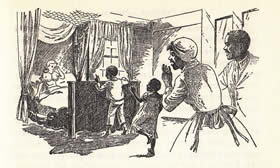
Black Santa's Save Christmas in 1864
"It was a grim hour for all of the South when William Tecumseh Sherman [was] marching relentlessly
through Georgia . . . [and a] young mother has caught much of the pathos of the hour in several
brief entries in her diary. Dolly Sumner Lunt, from Maine, married a planter who lived near
Covington, Georgia. Three years before the start of the war her husband died, and as Mrs. Thomas
Burge, Dolly continued on the estate with her daughter "Sadai" Sarah. The Burge’s were still
there when Sherman's men passed and many of the plantation Negroes, afraid of the soldiers,
slipped into the house to be with their mistress.
On Christmas Eve, Mrs. Burge described her preparations for a bleak meal, her attempts to
provide the plainest of presents for her remaining servants. "Now how changed!" she wrote,
"No confectionery, cakes or pies can I have. We are all sad....Christmas Eve, which has ever
been gaily celebrated here, which has witnessed the popping of firecrackers and the hanging
up of stockings, is an occasion now of sadness and gloom." Worse, she had nothing to
put in her Sadai's stocking, "which hangs so inviting for Santa Claus."
On Christmas night Mrs. Burge penned a sorrowful afternote: "Sadai jumped out of bed very early
this morning to feel in her stocking. She could not believe but that there would be something in it.
Finding nothing, she crept back into bed, pulled the cover over her face, and I soon heard her
sobbing." A moment later the young Negroes had run in: "Christmas gift, Mist'ess! Christmas
gift, Mist'ess!" Mrs. Burge drew the over her own face and wept beside her daughter.
The next year, Christmas came more happily to the Burge plantation. On December 24 [1865]
the mother gave thanks to God for His goodness, "in preserving my life and so much of my
property." And on Christmas Day she added:
"Sadai woke very early and crept out of bed to her stocking. Seeing it well-filled, she soon had
a light and eight little Negroes around her, gazing upon the treasures. Everything opened that
could be divided was shared with them. "Tis the last Christmas, probably, that we shall be
together, freedmen! Now you will, I trust, have your own homes and
be joyful under your own vine and fig tree."
(The Southern Christmas Book, Harnett T. Kane, David McKay Company, 1958, pp. 205-206)
Copyright 2014 The North Carolina War Between the States Sesquicentennial Commission